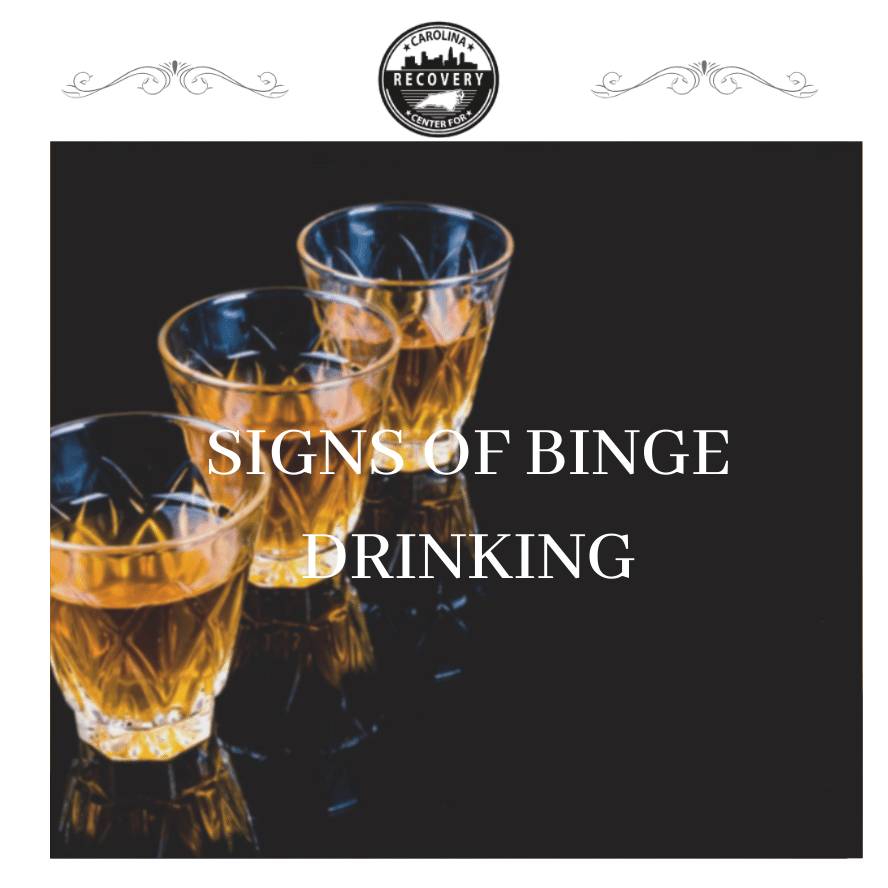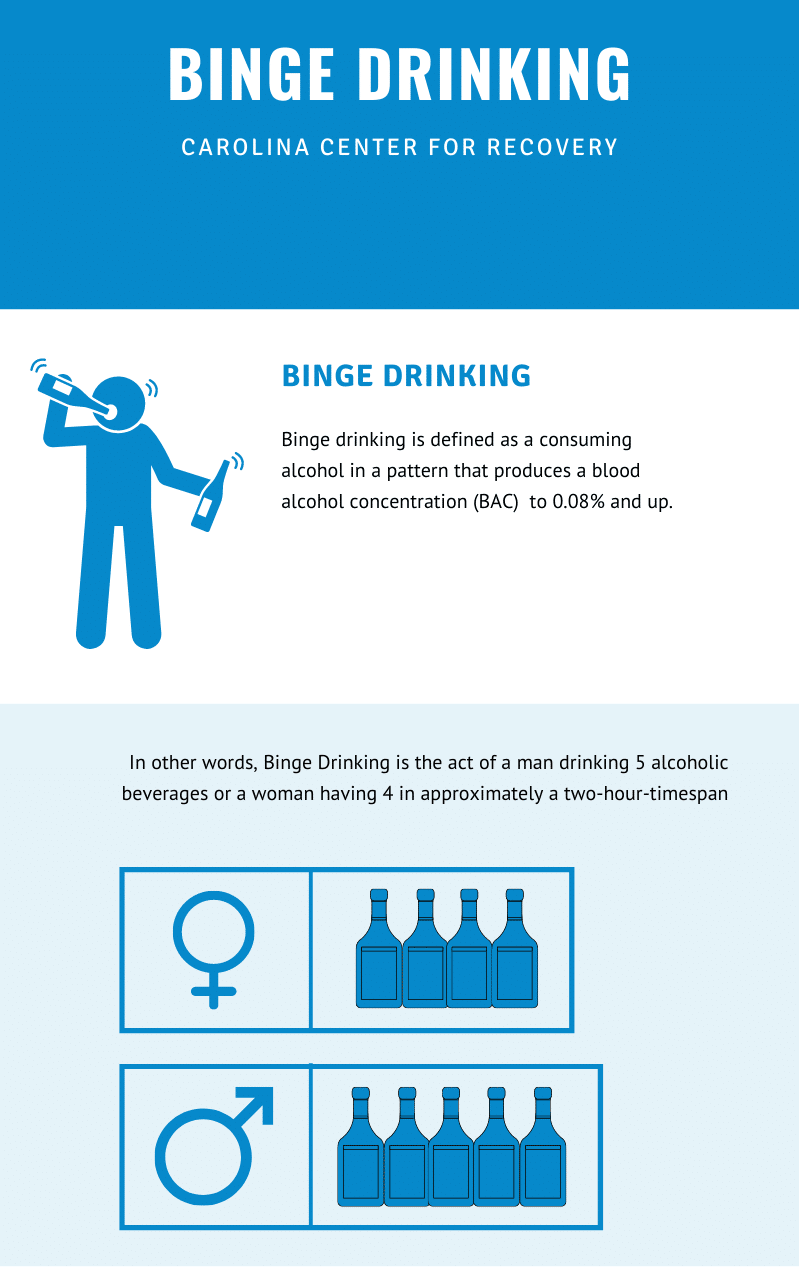Signs of Binge Drinking

Medically Verified: 2/1/24
Medical Reviewer
Chief Editor

All of the information on this page has been reviewed and verified by a certified addiction professional.
There are various warning signs to help detect binge drinking. The National Institute on Alcohol Abuse and Alcoholism defines binge drinking as an individual reaching a blood alcohol concentration level (BAC) to a percentage of .08 or higher. When an individual reaches a BAC of this level, there is a high potential for complicated health issues and risks. During these binges, many people consume approximately 7 or more alcoholic beverages. Excessive binge drinking can also increase the risk of individuals developing alcohol dependence or addiction.
Binge drinking is a serious but potentially preventable public health problem. The Center for Disease Control and Prevention (CDC) reports that one out of every six people binge drinks up to four times a month. Some individuals may be able to stop drinking without falling into the cycle of addiction. However, not everyone is able to continue this pattern of behavior unchanged. Knowing the signs of binge drinking is essential in recognizing if there is an underlying cause associated with you or your loved one’s alcohol consumption.

Recognizing the Signs of Binge Drinking
There are several signs and symptoms associated with binge drinking and alcohol abuse that indicate the need for you or your loved one to quit drinking. Identifying and addressing the signs of binge drinking can lower the risks of you or your loved one developing an alcohol use disorder. If you or someone you love is experiencing these symptoms of binge drinking, it is suggested that you seek professional help.
Some warning signs of binge drinking include:
- Excessive drinking for 5 or more days a month
- Anticipating and preparing for binge drinking by stocking up on copious amounts of alcohol before your planned consumption
- Engaging in precarious behaviors when drinking but having a reserved disposition when you are sober
- Pattern drinking on weekends or days when you are off work
- Obsessively anticipating the next event in which you can drink an excessive amount of alcohol
- Participating in risky behavior that you wouldn’t normally partake in
- Negating or slacking on your normal responsibilities because of your drinking
- Progressively consuming more alcoholic beverages over time, despite planning to only have a “few drinks”
- Frequent events planned around drinking
- Family members and loved ones worry about your behavior and your alcohol consumption
- Experiencing worsening hangovers and withdrawal symptoms when attempting to not drink alcohol
When an individual begins to binge drink regularly, over time the pattern escalates and becomes more frequent. You may begin to notice that you are consuming more alcohol each time you drink. Once this cycle begins, the chances of developing alcohol dependence and alcoholism increases.
Developing Signs of Alcoholism
Mild alcohol abuse can be easily overlooked and disguised as binge drinking. However, what may appear as a minor issue can easily become dangerous and potentially fatal over time. These early warning signs often follow excessive binge drinking and should not be overlooked.
- Experiencing reoccurring blackouts or short-term memory loss
- Exhibiting signs of irritability and extreme mood swings
- Making excuses for drinking such as to relax, mitigate stress, “let loose”, or to feel normal
- Drinking in isolation, distant from family members and friends
- Feeling hungover when not drinking
- Experiencing tremors upon awakening, when you have not consumed any alcohol
- Changing appearance, lack of self-care
- Adopting new friends and acquaintances to hang out with that partake in drinking the way that you do.
- Inexplainable bruises, scratches, injuries due to your drinking
- Erratic behavior when drinking, excessive impulsivity
- Unable to control the amount of alcohol you drink once you start
- Seizures when you are not drinking
- Lack of pleasure when not under the influence of alcohol
- Disinterest in activities and responsibilities when you are sober and not under the influence
- Inability to sleep without consuming alcohol
If left untreated, binge drinking can spiral out of control and ultimately lead to alcohol abuse and dependence. Alcohol use disorder is a diagnosis that is identified once an individual binges or abuses alcohol and experiences negative consequences but they cannot stop drinking. Recognizing the warning signs of early alcohol abuse and seeking proper alcohol detoxification can make a significant difference in someone’s life.
While it may be difficult to determine whether someone is struggling with alcohol, symptoms often co-occur. One symptom may snowball into another, and over time these warning signs fuel one another, leading to escalating consequences down the road.
Getting Help at Carolina Center for Recovery
No matter how minor a drinking problem may seem, alcohol abuse symptoms should never be ignored. Seeking alcohol treatment sooner rather than later will allow you to avoid the potential harmful symptoms of alcohol abuse. If you or your loved one is displaying the signs of binge drinking, Carolina Center for Recovery is here to help. Our inpatient alcohol rehab center specializes in treating mild to moderate alcohol abuse. Carolina Center for Recovery takes an individualized approach to assist in alcohol dependence recovery. Our compassionate staff will be with you every step of the way, from intake, detoxification, and all the way through the treatment process. Call us today!

